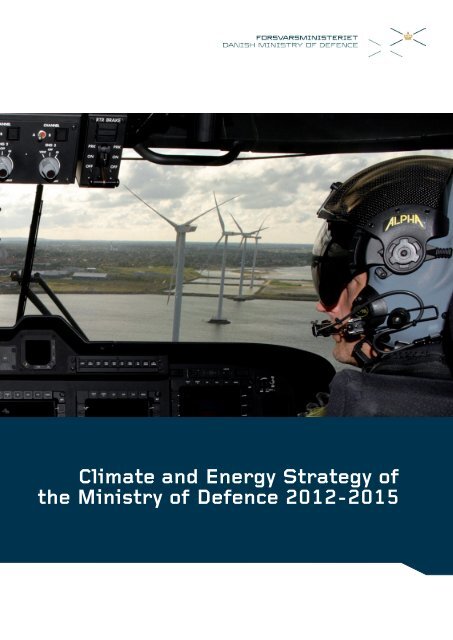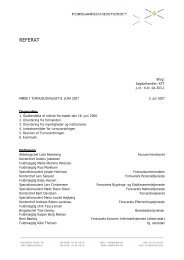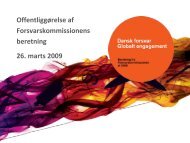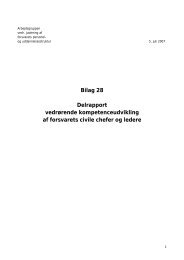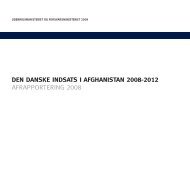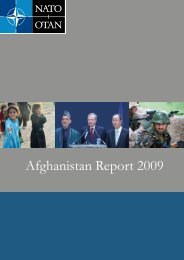Climate and Energy Strategy of the Ministry of Defence 2012-2015
Climate and Energy Strategy of the Ministry of Defence 2012-2015
Climate and Energy Strategy of the Ministry of Defence 2012-2015
Create successful ePaper yourself
Turn your PDF publications into a flip-book with our unique Google optimized e-Paper software.
<strong>Climate</strong> <strong>and</strong> <strong>Energy</strong> <strong>Strategy</strong> <strong>of</strong><br />
<strong>the</strong> <strong>Ministry</strong> <strong>of</strong> <strong>Defence</strong> <strong>2012</strong>-<strong>2015</strong>
Content<br />
Preface page 01<br />
A cross-organisational strategy for climate <strong>and</strong> energy page 02<br />
Focus areas page 33<br />
Reading instructions, organisation <strong>and</strong> process page 03<br />
Focus area 1 – <strong>Energy</strong> optimisation <strong>of</strong> buildings page 04<br />
Focus area 2 – <strong>Energy</strong> <strong>and</strong> <strong>the</strong> environment in operations page 06<br />
Focus area 3 – Renewable energy <strong>and</strong> reorientation <strong>of</strong> energy<br />
page 9<br />
Focus area 4 – <strong>Climate</strong>- <strong>and</strong> energy-appropriate<br />
page 11<br />
Focus area 5 – <strong>Climate</strong> accounts<br />
page 13<br />
Focus area 6 – <strong>Energy</strong> management<br />
page 14<br />
2
Preface<br />
The <strong>Ministry</strong> <strong>of</strong> <strong>Defence</strong> is one <strong>of</strong> Denmark’s largest<br />
workplaces. We are active throughout Denmark <strong>and</strong><br />
own buildings <strong>and</strong> l<strong>and</strong> all over <strong>the</strong> country. We<br />
operate in many <strong>of</strong> <strong>the</strong> world’s unstable areas. By<br />
spear-heading climate <strong>and</strong> energy solutions, we<br />
can reduce our energy consumption <strong>and</strong> impact on<br />
<strong>the</strong> climate. This will benefit <strong>the</strong> climate <strong>and</strong> <strong>the</strong><br />
environment. Fur<strong>the</strong>rmore, <strong>the</strong>re is money to save<br />
<strong>and</strong> operational benefits to gain by keeping our energy<br />
consumption in check <strong>and</strong> reducing our fossil fuel<br />
dependency. A specific example is <strong>the</strong> vulnerability<br />
<strong>and</strong> logistic challenge involved in transporting large<br />
amounts <strong>of</strong> fossil fuels to international mission areas.<br />
Climatic change <strong>and</strong> scarce energy resources are<br />
among <strong>the</strong> most significant challenges <strong>of</strong> our time.<br />
As a large organisation with a correspondingly large<br />
energy consumption, we have an obligation to<br />
reduce our impact on <strong>the</strong> climate <strong>and</strong> contribute to<br />
<strong>the</strong> goal <strong>of</strong> making Denmark independent <strong>of</strong> fossil<br />
fuels by 2050.<br />
With this <strong>Climate</strong> <strong>and</strong> <strong>Energy</strong> <strong>Strategy</strong>, we will make<br />
a focused <strong>and</strong> ambitious effort to make for a greener<br />
organisation in a cost-effective manner.<br />
I hope that we may find new, better <strong>and</strong> economically<br />
attractive solutions to <strong>the</strong> climate <strong>and</strong> energy<br />
challenges facing <strong>the</strong> <strong>Ministry</strong> <strong>of</strong> <strong>Defence</strong> through<br />
cooperation with private actors <strong>and</strong> research<br />
institutions. At <strong>the</strong> same time, I have a hope that <strong>the</strong><br />
<strong>Strategy</strong> will contribute to our constant focus on<br />
climate <strong>and</strong> energy at <strong>the</strong> <strong>Ministry</strong> <strong>of</strong> <strong>Defence</strong>.<br />
We will not find all <strong>the</strong> solutions to our climate <strong>and</strong><br />
energy challenges in one go, but with our new<br />
<strong>Strategy</strong>, we are well on <strong>the</strong> way!<br />
Nick Hækkerup<br />
1
A cross-organisational strategy for climate<br />
<strong>and</strong> energy<br />
<strong>Energy</strong> was previously a minor part <strong>of</strong> <strong>the</strong> environmental<br />
strategy <strong>of</strong> <strong>the</strong> <strong>Ministry</strong> <strong>of</strong> <strong>Defence</strong>. With<br />
this <strong>Climate</strong> <strong>and</strong> <strong>Energy</strong> <strong>Strategy</strong>, however, we are<br />
focusing exclusively on climate <strong>and</strong> energy issues,<br />
including carbon emissions <strong>and</strong> energy consumption,<br />
within <strong>the</strong> entire field <strong>of</strong> responsibility <strong>of</strong> <strong>the</strong> <strong>Ministry</strong><br />
<strong>of</strong> <strong>Defence</strong>.<br />
The <strong>Ministry</strong> <strong>of</strong> <strong>Defence</strong> carries out numerous <strong>and</strong><br />
different tasks. Most people know <strong>of</strong> <strong>the</strong> operative<br />
tasks; ranging from our involvement in <strong>the</strong> world’s<br />
unstable areas to our search <strong>and</strong> rescue operations,<br />
aerial surveillance <strong>and</strong> sovereignty enforcement.<br />
What many people do not know is that we are also<br />
responsible for <strong>the</strong> operation <strong>of</strong> a large number <strong>of</strong><br />
buildings, workshops <strong>and</strong> l<strong>and</strong> areas. All parts <strong>of</strong> <strong>the</strong><br />
area <strong>of</strong> <strong>the</strong> <strong>Ministry</strong> <strong>of</strong> <strong>Defence</strong> are included in <strong>the</strong><br />
<strong>Climate</strong> <strong>and</strong> <strong>Energy</strong> <strong>Strategy</strong>.<br />
With this <strong>Climate</strong> <strong>and</strong> <strong>Energy</strong> <strong>Strategy</strong>, <strong>the</strong> <strong>Ministry</strong><br />
<strong>of</strong> <strong>Defence</strong> is adhering to <strong>the</strong> national policy for<br />
climate <strong>and</strong> energy, which is based on a long-term<br />
goal that Denmark is to be independent <strong>of</strong> fossil<br />
fuels by 2050.<br />
The <strong>Climate</strong> <strong>and</strong> <strong>Energy</strong> <strong>Strategy</strong> involves a costeffective<br />
reduction in carbon emissions from our<br />
activities – nationally as well as internationally. At<br />
<strong>the</strong> same time, <strong>the</strong> <strong>Strategy</strong> must contribute to<br />
reducing energy consumption <strong>and</strong> maintaining it at<br />
<strong>the</strong> lowest possible level. The reduction <strong>of</strong> energy<br />
consumption will be through combined technical <strong>and</strong><br />
behavioural initiatives.<br />
The <strong>Ministry</strong> <strong>of</strong> <strong>Defence</strong> participates actively in<br />
exchange <strong>of</strong> experience regarding climate <strong>and</strong><br />
energy challenges with defence <strong>and</strong> emergency<br />
response agencies in o<strong>the</strong>r countries. We are<br />
also contributing to spotlighting <strong>the</strong> issue in<br />
international cooperation fora, for example in <strong>the</strong><br />
Nordic countries <strong>and</strong> in NATO.<br />
Through <strong>the</strong> <strong>Strategy</strong>, <strong>the</strong> <strong>Ministry</strong> <strong>of</strong> <strong>Defence</strong> wants<br />
to secure focused development in order to significantly<br />
reduce our climate impact. Our efforts in <strong>the</strong><br />
climate <strong>and</strong> energy field must take into account<br />
<strong>the</strong> tasks <strong>and</strong> <strong>the</strong> financial situation <strong>of</strong> <strong>the</strong> <strong>Ministry</strong><br />
<strong>of</strong> <strong>Defence</strong>, as well as legislative <strong>and</strong> authority<br />
dem<strong>and</strong>s.<br />
Our mission with <strong>the</strong> <strong>Climate</strong> <strong>and</strong> <strong>Energy</strong> <strong>Strategy</strong> is that, in our work for peace<br />
<strong>and</strong> security at home <strong>and</strong> abroad, we reduce our energy consumption <strong>and</strong> avoid<br />
any unnecessary contribution to <strong>the</strong> climate change.<br />
Our vision is that by <strong>the</strong> end <strong>of</strong> 2020, we will have<br />
• reduced our energy consumption by a minimum <strong>of</strong> 20% in relation to 2006.<br />
Before <strong>the</strong> end <strong>of</strong> <strong>2015</strong>, our energy consumption must be reduced by a minimum<br />
<strong>of</strong> 15%.<br />
• increased <strong>the</strong> share <strong>of</strong> our electricity consumption from renewable energy to at<br />
least 60%. Before <strong>the</strong> end <strong>of</strong> <strong>2015</strong>, <strong>the</strong> share must be at least 25%.<br />
• reduced carbon emissions stemming from our activities (though not operative<br />
activities) by 40% in relation to 1990. Before <strong>the</strong> end <strong>of</strong> <strong>2015</strong>, emissions must<br />
be reduced by 30%.<br />
2
Focus areas<br />
In order to fulfil <strong>the</strong> vision <strong>of</strong> <strong>the</strong> <strong>Climate</strong> <strong>and</strong> <strong>Energy</strong> <strong>Strategy</strong>, we have identified<br />
six focus areas for <strong>the</strong> <strong>Strategy</strong> up to <strong>2015</strong>:<br />
• <strong>Energy</strong> optimisation <strong>of</strong> buildings<br />
• <strong>Energy</strong> <strong>and</strong> <strong>the</strong> environment in operations<br />
• Renewable energy <strong>and</strong> energy conversion<br />
• <strong>Climate</strong>-appropriate <strong>and</strong> energy-appropriate behaviour<br />
• <strong>Climate</strong> accounts<br />
• <strong>Energy</strong> management<br />
Each focus area comprises an objective <strong>and</strong> a series<br />
<strong>of</strong> tangible goals, realising <strong>the</strong> vision <strong>of</strong> <strong>the</strong> <strong>Climate</strong><br />
<strong>and</strong> <strong>Energy</strong> <strong>Strategy</strong>.<br />
In addition to this, we will make environmentappropriate<br />
<strong>and</strong> energy-appropriate procurements.<br />
This has been incorporated as a focus area in <strong>the</strong><br />
Environment <strong>and</strong> Nature <strong>Strategy</strong> <strong>2012</strong>-<strong>2015</strong> <strong>of</strong> <strong>the</strong><br />
<strong>Ministry</strong> <strong>of</strong> <strong>Defence</strong>.<br />
Reading instructions, organisation <strong>and</strong> process<br />
In <strong>the</strong> following sections, <strong>the</strong> focus areas <strong>of</strong> <strong>the</strong><br />
<strong>Climate</strong> <strong>and</strong> <strong>Energy</strong> <strong>Strategy</strong> will be explained with<br />
a description <strong>of</strong> <strong>the</strong> background for each focus area,<br />
its objective, aims <strong>and</strong> specific goals.<br />
The <strong>Strategy</strong> is divided into several phases. Firstly,<br />
a better data basis must be established for energy<br />
consumption <strong>and</strong> carbon emissions. Secondly,<br />
various analytical processes must be initiated to<br />
identify <strong>and</strong> define goals for <strong>the</strong> activities we must<br />
carry out in order to achieve <strong>the</strong> best <strong>and</strong> most<br />
cost-effective climate <strong>and</strong> energy benefits. Finally,<br />
we are implementing a series <strong>of</strong> climate <strong>and</strong> energy<br />
optimisation initiatives in areas where we have<br />
enough knowledge to act immediately.<br />
This <strong>Climate</strong> <strong>and</strong> <strong>Energy</strong> <strong>Strategy</strong> replaces earlier<br />
sections on energy in o<strong>the</strong>r strategies, such as <strong>the</strong><br />
Environmental <strong>Strategy</strong> <strong>of</strong> <strong>the</strong> <strong>Ministry</strong> <strong>of</strong> <strong>Defence</strong><br />
<strong>of</strong> 2003. A revision <strong>of</strong> <strong>the</strong> present <strong>Strategy</strong> will be<br />
initiated in 2013, in order for a new strategy can be<br />
ready by <strong>2015</strong>.<br />
The <strong>Ministry</strong> <strong>of</strong> <strong>Defence</strong> has appointed <strong>the</strong> <strong>Defence</strong><br />
Facility Management as <strong>the</strong> cross-organisational<br />
climate <strong>and</strong> energy authority for <strong>the</strong> entire <strong>Ministry</strong><br />
<strong>of</strong> <strong>Defence</strong>. The person responsible for energy in <strong>the</strong><br />
<strong>Ministry</strong>’s field <strong>of</strong> competence is also at <strong>the</strong> <strong>Defence</strong><br />
Facility Management (see <strong>the</strong> circular regarding<br />
energy optimization in government institutions). The<br />
<strong>Defence</strong> Facility Management is also coordinating <strong>the</strong><br />
preparation <strong>of</strong> action plans for <strong>the</strong> present <strong>Strategy</strong>.<br />
A steering group will be appointed for <strong>the</strong> environment<br />
<strong>and</strong> energy area. The group will consist <strong>of</strong><br />
representatives from <strong>the</strong> <strong>Ministry</strong> <strong>of</strong> <strong>Defence</strong> <strong>and</strong> its<br />
adherent authorities. An annual report regarding <strong>the</strong><br />
status <strong>of</strong> <strong>the</strong> <strong>Climate</strong> <strong>and</strong> <strong>Energy</strong> <strong>Strategy</strong> will be<br />
given to <strong>the</strong> steering group <strong>and</strong> published (in<br />
Danish) on forsvaret.dk/fbe/energiiforsvaret.<br />
3
Focus area 1 – <strong>Energy</strong> optimisation <strong>of</strong> buildings<br />
The <strong>Ministry</strong> <strong>of</strong> <strong>Defence</strong> is <strong>the</strong> owner <strong>of</strong> a large building<br />
stock. A large part <strong>of</strong> our total energy consumption<br />
takes place in <strong>the</strong>se buildings. Our buildings date from<br />
<strong>the</strong> 17th century <strong>and</strong> up to today. The majority were<br />
built in <strong>the</strong> 1950s, 1960s <strong>and</strong> 1970s as st<strong>and</strong>ard constructions<br />
typical <strong>of</strong> <strong>the</strong>ir time. Over time, all buildings<br />
have been subject to varied levels <strong>of</strong> maintenance, <strong>and</strong><br />
many <strong>of</strong> <strong>the</strong> buildings are in <strong>the</strong> least energy-efficient<br />
end <strong>of</strong> <strong>the</strong> energy labelling system.<br />
About 50% <strong>of</strong> <strong>the</strong> buildings are heated by district<br />
heating, <strong>and</strong> <strong>the</strong> remaining part is heated by natural<br />
gas <strong>and</strong> oil. There are a modest number <strong>of</strong> renewable<br />
energy installations, such as solar collectors for<br />
heating utility water. There is thus a need for energy<br />
optimisation <strong>of</strong> <strong>the</strong> building stock by, for instance,<br />
demolishing very energy-consuming buildings,<br />
constructing <strong>of</strong> new buildings, making energy<br />
renovations, improving control <strong>of</strong> energy consumption<br />
(for instance by automatic on/<strong>of</strong>f functions), <strong>and</strong> by<br />
reviewing <strong>and</strong> improving technical installations.<br />
There is a huge potential for energy <strong>and</strong> cost savings<br />
through energy optimisation <strong>of</strong> <strong>the</strong> <strong>Ministry</strong>’s buildings.<br />
We expect to invest DKK 225 million on energy<br />
optimisation <strong>of</strong> buildings in <strong>the</strong> period 2011-2014. The<br />
annual saving is expected to be DKK 38 million when<br />
all projects have been completed.<br />
Overall objective<br />
We want to improve <strong>the</strong> energy efficiency <strong>of</strong> our buildings.<br />
Optimisation <strong>of</strong> <strong>the</strong> building stock<br />
Aim: <strong>the</strong> <strong>Ministry</strong> <strong>of</strong> <strong>Defence</strong> will optimise <strong>the</strong> use <strong>of</strong><br />
its building stock, based on overall consideration <strong>of</strong><br />
energy consumption, age, function <strong>and</strong> future use.<br />
Goal 1: Before <strong>the</strong> end <strong>of</strong> <strong>2012</strong>, on <strong>the</strong> basis <strong>of</strong> data<br />
collected <strong>and</strong> analyses, <strong>the</strong> <strong>Ministry</strong> <strong>of</strong> <strong>Defence</strong> will<br />
have prioritized which buildings are to be renovated,<br />
demolished or sold <strong>of</strong>f, after considering relevant<br />
factors.<br />
Goal 2: DKK 225 mill. have been earmarked for energy<br />
optimisation (2011-2014). In addition to this, an<br />
annual minimum <strong>of</strong> 3% (corresponding to app. 50,000<br />
sq meters) <strong>of</strong> <strong>the</strong> building stock must undergo energy<br />
renovation from 2013.<br />
Goal 3: From <strong>2012</strong>, analyses <strong>of</strong> possible energy<br />
savings must be prepared in connection with any<br />
renovation <strong>of</strong> a building exterior, <strong>and</strong> any renewal <strong>of</strong><br />
building-technical installations.<br />
Building st<strong>and</strong>ards<br />
Aim: <strong>the</strong> <strong>Ministry</strong> <strong>of</strong> <strong>Defence</strong> will intensify focus on <strong>the</strong><br />
use <strong>of</strong> low-energy building st<strong>and</strong>ards.<br />
Goal 1: From 2013, <strong>the</strong> <strong>Ministry</strong> <strong>of</strong> <strong>Defence</strong> will carry<br />
out a minimum <strong>of</strong> 50% <strong>of</strong> all new constructions as low<br />
energy class 2020.<br />
Certification<br />
Aim: <strong>the</strong> <strong>Ministry</strong> <strong>of</strong> <strong>Defence</strong> will increase <strong>the</strong> share<br />
<strong>of</strong> sustainable buildings (buildings with low energy<br />
consumption, low environmental impact <strong>and</strong> good indoor<br />
climate).<br />
Goal 1: From 2013, 50% <strong>of</strong> all new construction must<br />
be sustainability certified (<strong>the</strong> st<strong>and</strong>ards for sustainability<br />
certification are currently undergoing a major<br />
development, but at <strong>the</strong> moment we do not have a<br />
Danish st<strong>and</strong>ard).<br />
4
Automation<br />
Aim: <strong>the</strong> <strong>Ministry</strong> <strong>of</strong> <strong>Defence</strong> will increase <strong>the</strong> use <strong>of</strong><br />
intelligent automated control <strong>of</strong> energy consumption<br />
in buildings.<br />
Goal 1: Before <strong>the</strong> end <strong>of</strong> 2013, remote reading <strong>of</strong> all<br />
meters must be established <strong>and</strong> implemented.<br />
Goal 2: Before 2020, remote reading to be installed,<br />
established <strong>and</strong> implemented at building level in all<br />
buildings where it has been deemed pr<strong>of</strong>itable. By <strong>2015</strong>,<br />
this will have been carried out in 25% <strong>of</strong> buildings.<br />
Goal 3: From <strong>2012</strong>, <strong>the</strong> <strong>Ministry</strong> <strong>of</strong> <strong>Defence</strong> will<br />
exp<strong>and</strong> <strong>and</strong> upgrade existing energy management<br />
systems (central <strong>and</strong> electronic on/<strong>of</strong>f, <strong>and</strong> water,<br />
heating <strong>and</strong> electricity management), <strong>and</strong> establish<br />
energy management systems in establishments where<br />
<strong>the</strong>se are currently not available.<br />
<strong>Energy</strong> optimisation <strong>of</strong> buildings<br />
in practice<br />
In 2011-2014, <strong>the</strong> <strong>Ministry</strong> <strong>of</strong><br />
<strong>Defence</strong> will carry out energy optimisation<br />
<strong>of</strong> buildings totalling DKK<br />
225 million. Projects with short<br />
pay-back times will be completed<br />
first, <strong>and</strong> subsequently focus will be<br />
on larger projects with an expected<br />
correspondingly larger potential for<br />
energy savings. The annual saving<br />
is expected to be around DKK 38<br />
million, when all projects have been<br />
completed.<br />
<strong>Energy</strong> optimisation <strong>of</strong><br />
buildings in practice:<br />
In <strong>2012</strong>, <strong>the</strong> <strong>Ministry</strong> <strong>of</strong> <strong>Defence</strong> will<br />
initiate <strong>the</strong> ‘Green Establishments’<br />
project. The purpose <strong>of</strong> <strong>the</strong> project<br />
is for <strong>the</strong> <strong>Ministry</strong> <strong>of</strong> <strong>Defence</strong>, in<br />
collaboration with relevant Danish<br />
partners (private enterprises <strong>and</strong><br />
foundations, as well as stakeholder<br />
<strong>and</strong> educational bodies), to create<br />
two establishments, optimised in<br />
terms <strong>of</strong> energy, resources <strong>and</strong><br />
<strong>the</strong> environment. The two establishments<br />
must also be compatible<br />
with <strong>the</strong> core activities <strong>of</strong> <strong>Ministry</strong>.<br />
The project is expected to run for<br />
two to five years, <strong>and</strong> it is expected<br />
to inspire environment <strong>and</strong> energy<br />
initiatives in <strong>the</strong> <strong>Ministry</strong>’s o<strong>the</strong>r<br />
establishments.<br />
Installation <strong>of</strong> voltage stabilisation<br />
equipment to save electricity<br />
• Vi vil strategiperioden udarbejde en strategi for cyber defence.<br />
5
Focus area 2 –<br />
<strong>Energy</strong> <strong>and</strong> <strong>the</strong> environment in operations<br />
The operative tasks <strong>of</strong> <strong>the</strong> <strong>Ministry</strong> <strong>of</strong> <strong>Defence</strong> entail<br />
a large number <strong>of</strong> activities which affect nature, <strong>the</strong><br />
environment <strong>and</strong> <strong>the</strong> climate. This applies to energydem<strong>and</strong>ing<br />
transportation on l<strong>and</strong>, at sea <strong>and</strong> in <strong>the</strong><br />
air, as well as <strong>the</strong> use <strong>of</strong> high-tech equipment.<br />
A reduction in our dependency on fossil fuels <strong>and</strong><br />
application <strong>of</strong> new <strong>and</strong> better environment <strong>and</strong> energytechnology<br />
solutions in operative tasks not only gives<br />
us environmental <strong>and</strong> energy benefits, it may also<br />
provides us with many advantages in relation to<br />
operations <strong>and</strong> <strong>the</strong> logistical structure. A specific<br />
example is <strong>the</strong> vulnerability <strong>and</strong> logistic challenge<br />
involved in transporting large amounts <strong>of</strong> fossil fuels to<br />
international mission areas.<br />
The <strong>Ministry</strong> <strong>of</strong> <strong>Defence</strong> must be able to perform its<br />
tasks in <strong>the</strong> most efficient <strong>and</strong> safe manner possible.<br />
This means that we are primarily seeking out new options<br />
that can <strong>of</strong>fer us operative as well as environmental<br />
<strong>and</strong> energy-related benefits <strong>and</strong>, where possible,<br />
cost savings.<br />
We want to put an independent focus on ‘green thinking’<br />
in <strong>the</strong> operational part <strong>of</strong> our work, as this is an<br />
area with great potential for development. The area<br />
naturally links to o<strong>the</strong>r parts <strong>of</strong> environmental <strong>and</strong><br />
climate efforts, for instance in relation to environmental<br />
<strong>and</strong> energy-correct procurement as well as waste<br />
management.<br />
In international operational areas, it can be difficult<br />
to live up to Danish st<strong>and</strong>ards in relation to <strong>the</strong> environment<br />
<strong>and</strong> climate, typically due to <strong>the</strong> infrastructure<br />
in <strong>the</strong> area. Among o<strong>the</strong>r things, this complicates<br />
management <strong>of</strong> waste, oil <strong>and</strong> fuels. Denmark <strong>of</strong>ten<br />
cooperates with o<strong>the</strong>r nations on international<br />
missions, <strong>and</strong> <strong>the</strong>refore it is not always possible for us<br />
to set <strong>the</strong> st<strong>and</strong>ards for environment <strong>and</strong> climate, but<br />
we do seek active influence. Never<strong>the</strong>less, Denmark<br />
has positive experience from clearing camps after<br />
military operations in <strong>the</strong> Balkans.<br />
In addition to this, <strong>the</strong> Danish <strong>Defence</strong> has focussed<br />
on environmental impacts in a number <strong>of</strong> individual<br />
areas. Among <strong>the</strong>se are minimizing waste <strong>and</strong> utilising<br />
NOx filters on ships, environmentally correct waste<br />
<strong>and</strong> sewage management in mission areas, <strong>and</strong> use <strong>of</strong><br />
simulators for training.<br />
Refuelling a Fennec helicopter<br />
6
Overall objective<br />
We want to fur<strong>the</strong>r include consideration <strong>of</strong> <strong>the</strong> environment <strong>and</strong><br />
energy in operative tasks.<br />
Analyses<br />
Aim: <strong>the</strong> <strong>Ministry</strong> <strong>of</strong> <strong>Defence</strong> will carry out analyses<br />
which may lead to environment <strong>and</strong> energy goals<br />
for <strong>the</strong> operative part <strong>of</strong> <strong>the</strong> work <strong>of</strong> <strong>the</strong> <strong>Ministry</strong> <strong>of</strong><br />
<strong>Defence</strong>.<br />
Goal 1: During <strong>the</strong> period, <strong>and</strong> before <strong>the</strong> end <strong>of</strong> <strong>2015</strong>,<br />
we will regularly enter <strong>and</strong> participate in co-financed<br />
partnership projects for initiatives to improve energy<br />
efficiency <strong>and</strong> <strong>the</strong> environment.<br />
Goal 2: Before <strong>the</strong> end <strong>of</strong> <strong>2012</strong>, we will examine <strong>the</strong><br />
possibilities for – <strong>and</strong> initiate – cooperation in research<br />
<strong>and</strong> development projects, with focus on developing<br />
technological environmentally correct <strong>and</strong> energy-appropriate<br />
defence <strong>and</strong> emergency-response solutions.<br />
Goal 3: Before <strong>the</strong> end <strong>of</strong> 2013, we will have carried<br />
out an analysis process, dealing with energy consumption<br />
<strong>and</strong> logistics, energy <strong>and</strong> environment conditions<br />
in camps, as well as fuel consumption by mobile units.<br />
Goal 4: In <strong>2012</strong>, we will initiate an analysis process<br />
dealing with <strong>the</strong> options to utilise bio fuels with a view<br />
to establishing specific goals for this area before <strong>the</strong><br />
end <strong>of</strong> 2013.<br />
Goal 5: Before <strong>the</strong> end <strong>of</strong> 2014, all options for utilising<br />
renewable energy as <strong>the</strong> local supply <strong>of</strong> energy on missions<br />
abroad will be analysed <strong>and</strong> described.<br />
Goal 6: From 2013, we will allocate funds to research<br />
<strong>and</strong> development projects regarding technological<br />
environmentally correct <strong>and</strong> energy-appropriate<br />
defence solutions.<br />
Material <strong>and</strong> equipment<br />
Aim: <strong>the</strong> <strong>Ministry</strong> <strong>of</strong> <strong>Defence</strong>, as a minimum, must<br />
meet civilian st<strong>and</strong>ards <strong>and</strong> carry out logistical optimisation<br />
in comparable areas, without compromising<br />
operational conditions.<br />
Goal 1: Before <strong>the</strong> end <strong>of</strong> 2014, as a minimum,<br />
Danish <strong>Defence</strong> must adhere to <strong>the</strong> environmental <strong>and</strong><br />
climate goals <strong>of</strong> <strong>the</strong> Danish Shipowners’ Association -<br />
as long as operative conditions are not compromised.<br />
Goal 2: Before <strong>the</strong> end <strong>of</strong> 2014, we will have initiated<br />
optimisation <strong>of</strong> transportation in relation to<br />
internal distribution, transportation on l<strong>and</strong>, as well as<br />
national <strong>and</strong> multinational utilisation rates for<br />
transport vehicles, <strong>and</strong> we will have incorporated <strong>the</strong>se<br />
with civilian options.<br />
Goal 3: Before <strong>2015</strong>, consideration for <strong>the</strong> environment<br />
<strong>and</strong> energy must be included in activities regarding<br />
camp-support for units, <strong>the</strong> activities <strong>of</strong> national<br />
support units, local disposal <strong>of</strong> material, <strong>and</strong> recycling<br />
<strong>of</strong> packaging <strong>and</strong> transport containers.<br />
Change <strong>of</strong> behaviour<br />
Aim: <strong>the</strong> <strong>Ministry</strong> <strong>of</strong> <strong>Defence</strong> will change individual<br />
<strong>and</strong> collective behaviours during operations, in order<br />
to incorporate regard for <strong>the</strong> environment <strong>and</strong> energy<br />
into all contexts where it does not compromise<br />
operations.<br />
Goal 1: Before <strong>the</strong> end <strong>of</strong> 2013, we will have<br />
identified <strong>the</strong> most important areas (within our area<br />
<strong>of</strong> operation) where <strong>the</strong>re is a need to alter individual<br />
<strong>and</strong> collective behaviours, in order to focus on <strong>the</strong><br />
environment <strong>and</strong> energy.<br />
Goal 2: Before <strong>the</strong> end <strong>of</strong> <strong>2015</strong>, we will have revised<br />
our operative procedures, manuals <strong>and</strong> instructions<br />
with a view to incorporating environment <strong>and</strong> energy<br />
considerations.<br />
• Vi vil strategiperioden udarbejde en strategi for cyber defence.<br />
7
<strong>Energy</strong> <strong>and</strong> <strong>the</strong> environment<br />
in operations in practice:<br />
Denmark’s international engagement<br />
involves establishing, operating<br />
<strong>and</strong> decommissioning camps.<br />
When <strong>the</strong> last soldier left <strong>the</strong> Danish<br />
camp in Kosovo, <strong>the</strong> Danish <strong>Defence</strong><br />
sent in a team <strong>of</strong> environmental<br />
experts to close <strong>the</strong> camp with <strong>the</strong><br />
greatest possible consideration<br />
for <strong>the</strong> environment. Contaminated<br />
soil <strong>and</strong> waste from <strong>the</strong> shut-down<br />
operations was managed in an<br />
environmentally correct manner,<br />
so as not to expose <strong>the</strong> local population<br />
<strong>and</strong> environment to harmful<br />
impacts. Excavation <strong>and</strong> transportation<br />
<strong>of</strong> contaminated soil was<br />
carried out by local firms under<br />
supervision <strong>of</strong> <strong>the</strong> environmental<br />
experts from Danish <strong>Defence</strong>.<br />
<strong>Energy</strong> <strong>and</strong> <strong>the</strong> environment<br />
in operations in practice:<br />
The <strong>Ministry</strong> <strong>of</strong> <strong>Defence</strong> uses new<br />
technology, which limits impacts on<br />
<strong>the</strong> environment <strong>and</strong> <strong>the</strong> climate.<br />
<strong>Energy</strong> <strong>and</strong> <strong>the</strong> environment<br />
in operations in practice:<br />
Modern armoured fighting vehicles<br />
dem<strong>and</strong> ever more electrical power<br />
for a series <strong>of</strong> systems (communications,<br />
surveillance, targeting/<br />
securing targets, cooling, <strong>and</strong><br />
power supply for o<strong>the</strong>r electronic<br />
equipment). Much <strong>of</strong> <strong>the</strong> equipment<br />
must also function when <strong>the</strong><br />
vehicle is st<strong>and</strong>ing still. Traditionally<br />
this has been done by letting <strong>the</strong><br />
engine <strong>of</strong> <strong>the</strong> vehicle run idle with<br />
diesel generators or batteries. Fuel<br />
cells make up an operationally <strong>and</strong><br />
economically attractive alternative,<br />
due to less wear, higher effect,<br />
almost no exhaust gasses, <strong>and</strong> limited<br />
noise.<br />
Since January <strong>2012</strong>, Danish<br />
<strong>Defence</strong> has been part <strong>of</strong> a project,<br />
with Falck-Schmidt <strong>and</strong> General<br />
Dynamics UK as partners, <strong>and</strong><br />
Topsøe Fuel Cells as sub-contractors.<br />
The project will run for three<br />
years, <strong>and</strong> its purpose is to fur<strong>the</strong>r<br />
develop <strong>and</strong> integrate fuel cells into<br />
armoured fighting vehicles, in this<br />
way testing <strong>and</strong> demonstrating <strong>the</strong><br />
possibilities <strong>of</strong> this technology.<br />
During 2011, Denmark installed<br />
NOx reduction systems on Danish<br />
<strong>Defence</strong> DIANA class vessels. This<br />
means that we are reducing emissions<br />
harmful NOx gasses by up to<br />
80%. The NOx system was developed<br />
by Dansk Teknologi (Danish Technology),<br />
<strong>and</strong> it is based on similar<br />
systems developed for large trucks.<br />
• Vi vil strategiperioden udarbejde en strategi for cyber defence.<br />
8
Focus area 3 –<br />
Renewable energy <strong>and</strong> energy conversion<br />
So far, <strong>the</strong> <strong>Ministry</strong> <strong>of</strong> <strong>Defence</strong> has only used renewable<br />
energy to a limited degree.<br />
Positive climate effects may be achieved by reducing<br />
energy consumption <strong>and</strong> thus carbon emissions. A<br />
fur<strong>the</strong>r immediate carbon-reducing effect can be<br />
attained by converting from fossil fuels to renewable<br />
energy, such as solar, wind <strong>and</strong>/or bio energy.<br />
With <strong>the</strong> initiatives in this <strong>Strategy</strong>, <strong>the</strong> <strong>Ministry</strong> <strong>of</strong><br />
<strong>Defence</strong> is contributing to climate efforts, both by<br />
reducing energy consumption, <strong>and</strong> by converting to<br />
renewable energy. In addition to conversion to renewable<br />
energy, we see a great potential for carbon savings by<br />
converting from individual supply (oil/gas installations)<br />
to common energy supply (district heating).<br />
A substantial technological development is taking place<br />
in this field, <strong>and</strong> <strong>the</strong> various facilities for production <strong>of</strong><br />
renewable energy are becoming ever more cost-efficient.<br />
We have already installed solar panels <strong>and</strong> heat<br />
pumps at several locations, <strong>and</strong> we intend to exp<strong>and</strong><br />
<strong>the</strong> number <strong>of</strong> energy-producing facilities.<br />
Overall objective<br />
We want to increase <strong>the</strong> use <strong>of</strong> alternative <strong>and</strong> renewable energy<br />
sources.<br />
Analyses <strong>and</strong> determination <strong>of</strong> goals<br />
Aim: <strong>the</strong> <strong>Ministry</strong> <strong>of</strong> <strong>Defence</strong> will examine <strong>and</strong> catalogue<br />
<strong>the</strong> options for integrating renewable energy, in<br />
order to determine quantitative, measurable goals for<br />
<strong>the</strong> use <strong>of</strong> renewable energy sources.<br />
Goal 1: Before <strong>the</strong> end <strong>of</strong> 2013, we will analyse <strong>and</strong><br />
describe <strong>the</strong> options for increased use <strong>of</strong> electric cars<br />
(at establishments locally <strong>and</strong> in general).<br />
Goal 2: Before <strong>the</strong> end <strong>of</strong> 2013, we will set goals for<br />
<strong>the</strong> implementation <strong>of</strong> environmental <strong>and</strong> energyfriendly<br />
administrative road vehicles.<br />
Goal 3: Before <strong>the</strong> end <strong>of</strong> 2013, we will map <strong>the</strong><br />
locations where it is practicable to convert to district<br />
heating (common supply).<br />
Test projects <strong>and</strong> establishment <strong>of</strong><br />
renewable energy facilities<br />
Objective: <strong>the</strong> <strong>Ministry</strong> <strong>of</strong> <strong>Defence</strong> will perform regular<br />
energy- optimisation tests <strong>and</strong> will establish renewable<br />
energy facilities in selected establishments.<br />
Goal 1: From <strong>2012</strong>, we will regularly test <strong>the</strong><br />
pr<strong>of</strong>itability <strong>of</strong> new technology <strong>and</strong> carry out tests to<br />
optimise processes <strong>and</strong> methods for example finetuning<br />
ventilation plant <strong>and</strong> intelligent booking<br />
systems (see text box).<br />
Goal 2: Before <strong>the</strong> end <strong>of</strong> <strong>2015</strong>, one or more solar<br />
cell installations totalling at least 20,000 sq meters will<br />
be installed on l<strong>and</strong> areas belonging to <strong>the</strong> <strong>Ministry</strong> <strong>of</strong><br />
<strong>Defence</strong>. Before <strong>the</strong> end <strong>of</strong> 2013, one or more solar<br />
cell installations totalling at least 5,000 sq meters will<br />
be installed.<br />
Goal 3: Before <strong>the</strong> end <strong>of</strong> <strong>2012</strong>, potential sites will<br />
have been identified for <strong>the</strong> erection <strong>of</strong> wind turbines<br />
on <strong>Ministry</strong> <strong>of</strong> <strong>Defence</strong> l<strong>and</strong>.<br />
Goal 4: During <strong>2012</strong>, <strong>the</strong> ‘Grøn Christiansø’ project<br />
(Green Christian’s Isl<strong>and</strong>) will be defined <strong>and</strong> launched.<br />
The project will lead to optimisation <strong>of</strong> <strong>the</strong> isl<strong>and</strong> in<br />
terms <strong>of</strong> energy <strong>and</strong> <strong>the</strong> environment. Among o<strong>the</strong>r<br />
things, <strong>the</strong> project will examine whe<strong>the</strong>r <strong>the</strong> isl<strong>and</strong> can<br />
become self-sufficient with renewable energy.<br />
9
Applied renewable energy:<br />
The intelligent booking system used<br />
by Danish <strong>Defence</strong> is intended to<br />
ensure that consumption <strong>of</strong> electricity<br />
<strong>and</strong> heating in Danish <strong>Defence</strong><br />
quarters is managed by a rental<br />
system. When rooms are booked, <strong>the</strong><br />
system ensures that <strong>the</strong> electricity<br />
is switched on, <strong>and</strong> that heating is<br />
turned up to achieve an appropriate<br />
temperature before <strong>the</strong> room is to be<br />
used. The system prevents energy<br />
from being used unnecessarily.<br />
Applied renewable energy:<br />
The <strong>Ministry</strong> <strong>of</strong> <strong>Defence</strong> owns large<br />
areas <strong>of</strong> l<strong>and</strong> with space for solar<br />
cell installations. Before <strong>2015</strong>, solar<br />
cell installations totalling 20,000 sq<br />
meters will be established. Before<br />
<strong>the</strong> end <strong>of</strong> 2013, solar cell installations<br />
totalling 5,000 sq meters will<br />
be established, with a capacity to<br />
produce 500,000 kWh a year. This<br />
corresponds to about 0.5% <strong>of</strong> <strong>the</strong><br />
energy consumption <strong>of</strong> <strong>the</strong> <strong>Ministry</strong><br />
<strong>of</strong> <strong>Defence</strong>. The construction cost<br />
will be DKK 9-11 million, <strong>and</strong> it is<br />
anticipated that <strong>the</strong> investment will<br />
pay back within approx. 12 years.<br />
In principle, <strong>the</strong> installations will<br />
subsequently supply free electricity<br />
for approx. 18 years.<br />
Trial with small solar cell installation at Raghammer ranges on Bornholm<br />
10
Focus area 4 – <strong>Climate</strong>-appropriate <strong>and</strong> energyappropriate<br />
behaviour<br />
We expect to be able to reduce energy consumption<br />
by encouraging climate-appropriate <strong>and</strong> energy-appropriate<br />
behaviour in employees. The <strong>Ministry</strong> <strong>of</strong> <strong>Defence</strong><br />
is one <strong>of</strong> Denmark’s largest workplaces. It is <strong>the</strong>refore<br />
crucial that our employees are encouraged to act in<br />
ways that are appropriate in terms <strong>of</strong> energy <strong>and</strong> <strong>the</strong><br />
climate. In o<strong>the</strong>r words, employees must learn to turn<br />
everything <strong>of</strong>f. However, it is also about <strong>the</strong> employees<br />
<strong>and</strong> management finding better <strong>and</strong> more energy<br />
-appropriate everyday solutions.<br />
Until now, climate <strong>and</strong> energy campaigns have<br />
been organised on a local basis in <strong>the</strong> organisation.<br />
The many varied fields <strong>of</strong> activity in <strong>the</strong> <strong>Ministry</strong> <strong>of</strong><br />
<strong>Defence</strong> (ranging from operative tasks over <strong>of</strong>fice<br />
work to workshop activities) have complicated <strong>the</strong><br />
introduction <strong>of</strong> uniform <strong>and</strong> coordinated efforts.<br />
There is a need to raise people’s awareness about<br />
climate <strong>and</strong> energy, to establish general guidelines,<br />
<strong>and</strong> to arrange targeted climate <strong>and</strong> energy<br />
campaigns, cross-organisationally as well as for<br />
selected groups <strong>of</strong> employees.<br />
11
Overall objective<br />
We want to point <strong>the</strong> behaviour <strong>of</strong> our employees in a more climateappropriate<br />
<strong>and</strong> energy-appropriate direction.<br />
Changed employee behaviour<br />
Aim: in order to achieve positive climate effects <strong>and</strong><br />
energy savings, <strong>the</strong> <strong>Ministry</strong> <strong>of</strong> <strong>Defence</strong> will involve<br />
employees in finding new climate <strong>and</strong> energy solutions,<br />
<strong>and</strong> <strong>the</strong> <strong>Ministry</strong> will measure <strong>and</strong> change employee<br />
behaviour in relation to climate <strong>and</strong> energy.<br />
Goal 1: From 2013, <strong>the</strong> Minister <strong>of</strong> <strong>Defence</strong> will award<br />
an annual climate <strong>and</strong> energy prize to acknowledge <strong>the</strong><br />
best efforts <strong>of</strong> <strong>the</strong> year in <strong>the</strong> climate <strong>and</strong> energy area.<br />
Goal 2: Before <strong>the</strong> end <strong>of</strong> <strong>2012</strong>, a website on climate<br />
<strong>and</strong> energy will be established as a subsite in <strong>the</strong><br />
<strong>Defence</strong> Facility Management’s intranet <strong>and</strong> its <strong>of</strong>ficial<br />
website.<br />
Goal 3: Before <strong>the</strong> end <strong>of</strong> 2013, we will integrate<br />
climate <strong>and</strong> energy information (adapted to <strong>the</strong> function<br />
<strong>of</strong> <strong>the</strong> individual employee) as a part <strong>of</strong> <strong>the</strong> introduction<br />
<strong>of</strong> new employees throughout <strong>the</strong> organisation.<br />
<strong>Climate</strong>-appropriate <strong>and</strong><br />
energy-appropriate<br />
behaviour in practice:<br />
In 2011-<strong>2012</strong>, <strong>the</strong> <strong>Ministry</strong> <strong>of</strong><br />
<strong>Defence</strong> will be implementing <strong>the</strong><br />
‘<strong>Energy</strong> as required’ project in<br />
five strategic pilot energy establishments.<br />
All employees in <strong>the</strong> five<br />
establishments will be involved in<br />
defining areas in which technical<br />
initiatives may help obtain energy<br />
savings. The technology introduced<br />
should aim at ensuring that energy<br />
is only used where <strong>the</strong>re is a real<br />
need, for instance by installing light<br />
sensors in toilets.<br />
Goal 4: From <strong>2012</strong>, we will initiate annual targeted<br />
climate <strong>and</strong> energy campaigns in order to lower energy<br />
consumption.<br />
Goal 5: From 2013, we will carry out annual evaluations<br />
<strong>of</strong> <strong>the</strong> effect <strong>of</strong> campaigns in <strong>the</strong> preceding year by<br />
comparing our energy consumption before <strong>and</strong> after<br />
<strong>the</strong> campaigns.<br />
<strong>Climate</strong>-appropriate <strong>and</strong><br />
energy-appropriate<br />
behaviour in practice:<br />
The <strong>Ministry</strong> <strong>of</strong> <strong>Defence</strong> is one <strong>of</strong><br />
<strong>the</strong> government’s curve breakers.<br />
In cooperation with ‘Go’ Energi’<br />
(‘Good <strong>Energy</strong>’), a curve breaker<br />
agreement has been signed for <strong>the</strong><br />
five pilot energy establishments.<br />
The goal is to consume 5% less<br />
energy by <strong>the</strong> end <strong>of</strong> 2013 compared<br />
to consumption in 2009. consumption<br />
in 2009.<br />
• Vi vil strategiperioden udarbejde en strategi for cyber defence.<br />
12
Focus area 5 – <strong>Climate</strong> accounts<br />
<strong>Climate</strong> accounts for <strong>the</strong> activities <strong>of</strong> <strong>the</strong> <strong>Ministry</strong> <strong>of</strong><br />
<strong>Defence</strong> will give us a better data basis for identifying<br />
potential action areas to reduce <strong>the</strong> <strong>Ministry</strong>’s<br />
climate <strong>and</strong> air impacts. The climate accounts comprise<br />
statements <strong>of</strong> CO 2 emissions <strong>and</strong> air pollution from<br />
NOx, SOx <strong>and</strong> particles, toge<strong>the</strong>r with an overview <strong>of</strong><br />
<strong>the</strong> climate impact from <strong>the</strong> <strong>Ministry</strong>’s travel activities.<br />
Overall objective<br />
We want to prepare climate accounts <strong>and</strong> statements <strong>of</strong> air pollution<br />
from our activities.<br />
Annual balances <strong>and</strong> accounts<br />
Aim: <strong>the</strong> <strong>Ministry</strong> <strong>of</strong> <strong>Defence</strong> will prepare annual climate<br />
accounts, in order to establish percentage reduction<br />
goals for CO2, NOx, SOx <strong>and</strong> particle emissions.<br />
Goal 1: From <strong>2012</strong>, climate accounts must be prepared.<br />
goal 2: Before <strong>the</strong> end <strong>of</strong> <strong>2012</strong>, based on quantitative<br />
references, we will establish goals for percentage CO2<br />
reductions <strong>and</strong> also identify areas that are potentially<br />
suitable for reductions <strong>of</strong> NOx, SOx <strong>and</strong> particle emissions.<br />
<strong>Climate</strong> accounts in practice:<br />
From <strong>2012</strong>, <strong>the</strong> <strong>Ministry</strong> <strong>of</strong> <strong>Defence</strong><br />
will prepare CO 2 accounts based<br />
on <strong>the</strong> Guidelines for <strong>the</strong> preparation<br />
<strong>of</strong> climate accounts issued by<br />
<strong>the</strong> Danish <strong>Energy</strong> Authority. CO 2<br />
accounts are a calculation <strong>of</strong> <strong>the</strong><br />
carbon emissions stemming from<br />
our activities (except operative<br />
activities). The accounts will also<br />
comprise a statement <strong>of</strong> NOx, SOx<br />
<strong>and</strong> particle emissions.<br />
13
Focus area 6 – <strong>Energy</strong> management<br />
In order to meet <strong>the</strong> climate <strong>and</strong> energy goals <strong>of</strong> this<br />
<strong>Strategy</strong>, <strong>the</strong> <strong>Ministry</strong> <strong>of</strong> <strong>Defence</strong> needs an improved<br />
data basis <strong>of</strong> our energy consumption. Fur<strong>the</strong>rmore,<br />
<strong>the</strong>re is a need to monitor consumption <strong>and</strong> work<br />
systematically with energy initiatives. <strong>Energy</strong><br />
management is expected to help anchor <strong>the</strong> process at<br />
management level <strong>and</strong> ensure focus on <strong>the</strong> task. <strong>Energy</strong><br />
management will also provide <strong>the</strong> necessary overview<br />
<strong>of</strong> consumption <strong>and</strong> management needs.<br />
We expect to be able to substantially reduce our energy<br />
consumption <strong>and</strong> energy costs through implementation<br />
<strong>of</strong> energy management according to <strong>the</strong> ISO 50001<br />
st<strong>and</strong>ard.<br />
<strong>Energy</strong> management means a targeted <strong>and</strong> systematic<br />
effort to reduce <strong>the</strong> energy consumption <strong>of</strong> an<br />
organisation. A central part <strong>of</strong> an energy management<br />
system is well-functioning energy mapping <strong>and</strong> energy<br />
registration. With this in place, <strong>the</strong> goal for reductions<br />
can be established, <strong>and</strong> plans for improvement can be<br />
drawn up.<br />
Overall objective<br />
We want to introduce energy management according to <strong>the</strong><br />
ISO 50001 st<strong>and</strong>ard.<br />
Introduction <strong>of</strong> <strong>the</strong> energy<br />
management<br />
Aim: <strong>the</strong> <strong>Ministry</strong> <strong>of</strong> <strong>Defence</strong> will systematically<br />
introduce energy management according to <strong>the</strong><br />
ISO 50001 st<strong>and</strong>ard.<br />
Goal 1: Before <strong>the</strong> end <strong>of</strong> 2020, energy management<br />
according to <strong>the</strong> ISO 50001 st<strong>and</strong>ard must<br />
be implemented.<br />
Goal 2: Before <strong>the</strong> end <strong>of</strong> <strong>2015</strong>, energy management<br />
will be implemented at Aalborg Air Base,<br />
Karup Air Base <strong>and</strong> Skrydstrup Air Base.<br />
<strong>Energy</strong> management in<br />
practice:<br />
In <strong>2012</strong>, <strong>the</strong> <strong>Ministry</strong> <strong>of</strong> <strong>Defence</strong> will<br />
initiate a comprehensive mapping<br />
<strong>of</strong> electricity <strong>and</strong> heating consumption.<br />
The mapped data are <strong>the</strong> first<br />
step in implementation <strong>of</strong> energy<br />
management according to <strong>the</strong> ISO<br />
50001 st<strong>and</strong>ard. Implementation <strong>of</strong><br />
energy management is expected to<br />
lead to reductions in greenhouse<br />
gas emissions <strong>and</strong> energy costs<br />
by systematic management <strong>of</strong> our<br />
energy consumption.<br />
14
This <strong>Climate</strong> <strong>and</strong> <strong>Energy</strong> <strong>Strategy</strong> applies to all<br />
authorities within <strong>the</strong> field <strong>of</strong> responsibility <strong>of</strong> <strong>the</strong><br />
Danish <strong>Ministry</strong> <strong>of</strong> <strong>Defence</strong>:<br />
• The <strong>Ministry</strong> <strong>of</strong> <strong>Defence</strong><br />
• The <strong>Defence</strong> Comm<strong>and</strong> <strong>and</strong> subordinated<br />
authorities<br />
• The Danish Emergency Management Agency<br />
• The Homeguard Comm<strong>and</strong> <strong>and</strong> subordinated<br />
authorities<br />
• The <strong>Defence</strong> Intelligence Service<br />
• The Judges Advocate General’s Corps<br />
• The <strong>Defence</strong> Internal Audit<br />
The <strong>Ministry</strong> <strong>of</strong> <strong>Defence</strong> <strong>2012</strong><br />
The <strong>Ministry</strong> <strong>of</strong> <strong>Defence</strong><br />
Holmens Kanal 42<br />
1060 København K<br />
Phone: +45 3392 3320<br />
Fax: +45 3332 0655<br />
fmn@fmn.dk<br />
fmn.dk


